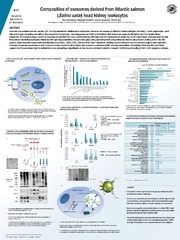Composition of exosomes derived from Atlantic salmon (Salmo salar) head kidney leukocytes
Permanent link
https://hdl.handle.net/10037/8888Date
2015-06-28Type
Conference objectKonferansebidrag
Abstract
Exosomes are secreted nanosize vesicles (30−100 nm) derived from multivesicular endosomes. Exosomes are released by different immune cell types, including T- and B-lymphocytes, mast
cells and antigen-presenting cells (APCs). The composition of exosomes - including protein and RNA content reflects their endosomal origin and the type of cells that produce them.
Mammalian APCs produce large amounts of exosomes loaded with MHC class I and II molecules with important immunomodulatory properties. In the current study, exosomes were isolated
from salmon head kidney leukocytes stimulated with CpG oligonucleotides and yeast beta-glucan (BG) and their protein composition was studied using Western blotting and LC-MS/MS
analysis. Major exosome markers were detected including flotillin, CD63, CD81, CD9 and MHC-I and II molecules. Ontology analysis indicated that the exosome samples were enriched in
ribosomal, membrane-associated as well as nuclear proteins the last of which reflects the abundance of histones within exosome preparations. Interestingly, label-free MS quantitation
suggests that the exosomes might be derived from cross-presenting compartments as they are also enriched in proteins involved in trafficking and loading of MHC-I with exogenous antigens.


 English
English norsk
norsk